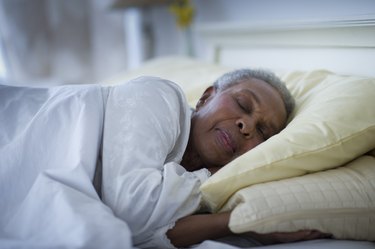
You've got your healthy nighttime routine down pat and are going to bed at a decent hour. But you're still struggling to fall or stay asleep, thanks to nagging hip pain. So what's going on, and what can you do to feel better?
Hip pain when sleeping often stems from a hip condition or an injury, says Angelie Mascarinas, MD, a board-certified physiatrist with the Hospital for Special Surgery Florida in West Palm Beach. When that happens, "lying on your side can put pressure on the area and cause stress or discomfort," she adds.
Video of the Day
Video of the Day
Here's a look at some of the most common culprits and how to relieve hip pain while sleeping.
1. Hip Bursitis
Hip bursitis, a condition that happens when the small, fluid-filled sacs that provide cushioning around the joints become inflamed, is among the most common causes of hip pain at night, Dr. Mascarinas says.
It can cause hip pain or stiffness that gets worse when you press on it and make your hip appear red or swollen.
Anyone can develop hip bursitis, especially after a hip injury. But older adults and those with rheumatoid arthritis or other inflammatory conditions are more prone to the problem, notes the Mayo Clinic.
Fix It
Rest and ice can usually clear up a case of hip bursitis within a few weeks. If your symptoms are severe, you might also need physical therapy or corticosteroid injections to reduce inflammation in your hip.
2. Gluteal Tendonitis
Over time, repetitive movements (from sports or gardening, for instance) can cause micro tears in the hip tendons, leading to inflammation and pain deep in the hip, including when you're lying down. The pain can start suddenly or come on gradually, the Cleveland Clinic notes.
More severe tears can lead to gluteal tendinopathy, where the hip tendon tissue starts to break down or deteriorate. This can cause more intense hip pain, especially when climbing stairs, lying on your side or sitting for long stretches.
Gluteal tendonitis or tendinopathy is more likely to affect adults over 40 because their hip muscles are stiffer and less elastic. Poor posture, rheumatoid arthritis and taking fluoroquinolone antibiotics or statins can also increase your risk.
Fix It
Rest, ice, compression, elevation and over-the-counter anti-inflammatory meds (think: ibuprofen) can usually help clear up a case of gluteal tendonitis, though in some cases physical therapy, steroid injections or surgery may be needed. Gluteal tendinopathy is more likely to need physical therapy or surgery to heal, says the Cleveland Clinic.
3. Hip Flexor Strain
If your nighttime hip pain is accompanied by pain when you're walking or climbing stairs, swelling, weakness or stiffness, you may have a hip flexor strain.
These injuries happen when a muscle supporting the hip joint is stretched or strained, which can often occur from sports like running, hockey, football, soccer or martial arts, the Cleveland Clinic says.
Fix It
Again, rest, ice, compression and elevation are the best way to help mild hip strains heal. You can also take an over-the-counter anti-inflammatory medication to ease discomfort, notes the American Academy of Orthopaedic Surgeons.
If that's not enough to give you relief, your doctor may recommend physical therapy, or in severe cases, surgery.
4. Arthritis
Arthritis in your hip joint can make your hip stiff and uncomfortable during the day and cause aching or soreness when you sleep on it, Dr. Mascarinas says.
Hip osteoarthritis can occur from normal, age-related wear and tear, and may only affect one hip. Rheumatoid arthritis, one the other hand, is an autoimmune disease that typically causes pain, stiffness and swelling in multiple joints on both sides of the body, says Johns Hopkins Medicine. The stiffness can be especially noticeable in the morning.
Adults who are older or who have overweight are more prone to developing hip osteoarthritis. Rheumatoid arthritis is more likely to occur in women, especially those who are middle-aged or smokers.
Fix It
See your doctor if you're having arthritis symptoms. You'll need to determine which type of arthritis you have in order to decide on the best treatment.
Osteoarthritis can often be managed with anti-inflammatory medications and physical therapy, while rheumatoid arthritis requires stronger prescription medications like disease-modifying antirheumatic drugs (DMARDs) or biologics to keep the condition from getting worse, says the Mayo Clinic.
Natural remedies for arthritis pain can complement your prescribed treatment, too.
5. Pregnancy
Especially toward the end of pregnancy, carrying excess weight can put extra strain on your back or hips and make it harder to find a comfortable sleeping position, according to Nemours.
It's especially common to notice pain in your left hip, because pregnant people are often advised to sleep on their left side to enhance blood flow to the developing fetus.
Fix It
Pregnancy-related hip pain isn't fun, but it should ease up after you give birth. In the meantime, take steps to find a more comfortable sleeping position (like the ones below) so you can get as much rest as you can.
Other tips for better sleep when you're pregnant include getting movement in during the day and sleeping with a pregnancy pillow.
6. Sleep Position or Old Mattress
Sometimes the problem isn't your hip — it's the way you're sleeping, or the fact that your mattress is past its prime.
Chances are, one of those is the culprit if your hip only bothers you when you're lying in bed, says the Arthritis Foundation.
Fix It
Try switching sides or sleeping on your back. If other sleeping positions end up being similarly uncomfortable, your mattress could be to blame, especially if it's more than seven to 10 years old or has visible signs of sagging, says Kunal Kumar, MD, Medical Director of the Sleep Center at Einstein Medical Center in Philadelphia, Pennsylvania.
How to Relieve Hip Pain While Sleeping
Hip pain at night can have a number of possible causes with different potential treatments. But when you're tossing and turning at 3 a.m., you need fast relief to help you get back to sleep.
Dr. Mascarinas recommends the following:
- Switch positions. Lying on your back takes the pressure off your hips. Still prefer sleeping on your side? Try to at least switch to the hip that's not in pain.
- Use a pillow. Tucking a pillow under your knees can take pressure off of your hip flexors when you're sleeping on your back. Side sleepers can tuck a pillow between their knees to take stress off the hip tendons. Any pillow will ultimately get the job done, but large body pillows (like these expert-recommended options) may provide more support.
- Try adding a mattress topper. If you suspect your mattress is to blame but you're not in the market for a new one, adding a mattress topper can give you more cushioning and take some pressure off of your hip.
- Try a pain reliever before bed. If lifestyle measures aren't doing enough, take an over-the-counter pain reliever like acetaminophen (Tylenol) or ibuprofen about an hour before bedtime. It should kick in as you're falling asleep and help you drift off more comfortably.
During the day, make it a point to avoid sitting with your legs crossed or standing on one leg, both of which can strain your hips, Dr. Mascarinas adds.
Also, try to steer clear of sitting in low chairs that force your hips to bend more than 90 degrees.
When to See a Doctor About Hip Pain While Sleeping
Though it might take a few days or weeks, hip pain that occurs during the day or at night will often ease up with at-home measures. If that's not happening or if you're finding it impossible to get comfortable during the night, let your doctor know.
Seek medical attention, too, for hip pain that's accompanied by a fever or chills, skin discoloration or deformed-looking joints, or if you're not able to bear weight on the hip, Dr. Mascarinas recommends. Those could be signs of an infection or a fracture, both of which require immediate medical treatment.
- Mayo Clinic: "Bursitis"
- Cleveland Clinic: Tendinitis
- Cleveland Clinic: "Gluteal Tendinopathy"
- Cleveland Clinic: "Hip Flexor Strain"
- American Academy of Orthopedic Surgeons: "Hip Strains"
- Johns Hopkins Medicine: "Hip Arthritis"
- Mayo Clinic: "Rheumatoid Arthritis"
- Nemours: "Sleep During Pregnancy"
- Arthritis Foundation: "Hip Pain at Night?"
Is this an emergency? If you are experiencing serious medical symptoms, please see the National Library of Medicine’s list of signs you need emergency medical attention or call 911.


